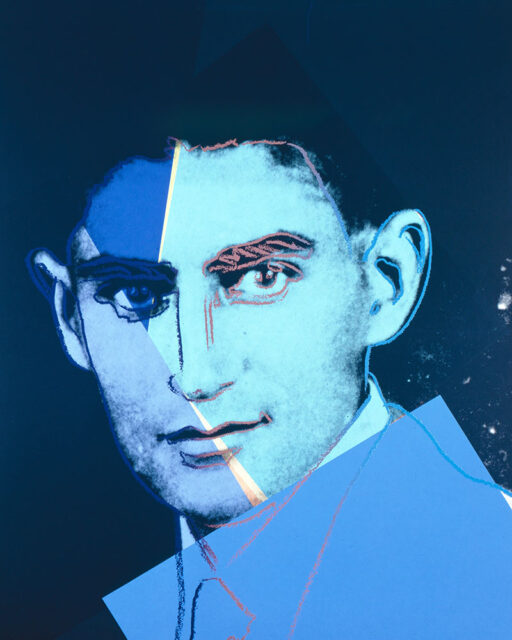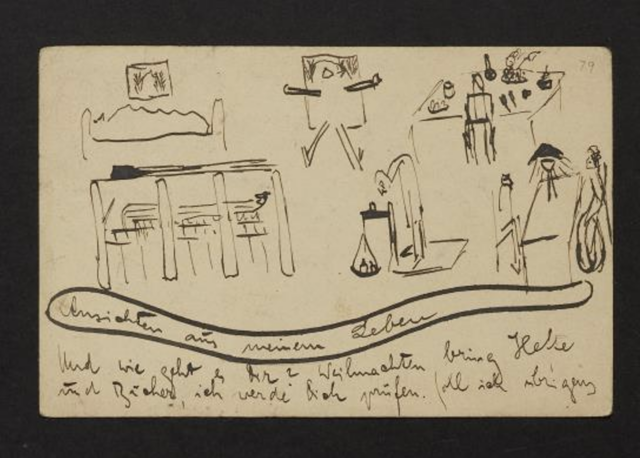
Andy Warhol, Portrait of Franz Kafka, silkscreen print, 1980 (courtesy of Ronald Feldman Gallery, New York © the Andy Warhol Foundation for the Visual Arts / Artists Rights Society (ARS), New York / Ronald Feldman Gallery, New York)
FRANZ KAFKA: PROGRAMS
Morgan Library & Museum
225 Madison Ave. at 36th St.
Tuesday – Sunday through April 13, $13-$25
www.themorgan.org
There are not a lot of authors whose name has been acknowledged as a legitimate adjective in Merriam-Webster’s dictionary, and even fewer of those adjectives have been used as the name of a musical. In fact, the only one might be Kafkaesque, which is used for anything that relates to Czech-born German-language writer Franz Kafka and has “a nightmarishly complex, bizarre, or illogical quality.”
Last fall, James Harvey’s musical comedy Kafkaesque! opened off-off-Broadway at Theatre 154 in the West Village, about one American family experiencing predicaments inspired by Kafka’s writings. The first song gets right to the point when Kafka sings, “By age forty I was dead / never had kids and I never wed / the words I wrote were hardly read / but now I’m an adjective.”
Kafka and his work have grown in stature since his passing in June 1924 at the age of forty from tuberculosis, leaving behind a literary legacy that includes the novels The Castle, The Trial, and Amerika and such influential stories as “The Judgment,” “In the Penal Colony,” and “The Metamorphosis.”
The Morgan Library is celebrating that legacy with the simply titled exhibition “Franz Kafka,” continuing through April 13. The show features original notebooks and manuscripts, letters about vegetarianism and his first hemorrhage, postcards, illustrated pages, family photos, handwritten aphorisms, first editions, architectural models, a diary, and other ephemera, primarily from the Bodleian Library, organized into such sections as “Life and Times: Health and Illness,” “Life and Times: Jewishness,” “Journeys: Around Europe,” and “Journeys: Of the Imagination.”
In his catalogue essay “Kafka’s Life and World,” British editor Ritchie Robertson writes, “Even during his final illness he kept writing. In March 1924 he wrote his last story, ‘Josefine, the Singer or The Mouse-People,’ and on his death-bed he corrected the proofs of the volume, A Hunger Artist: Four Stories, in which the story was included. ‘Josefine’ is a masterpiece of Kafka’s gentle, self-deprecating humour, and ends with the unexplained disappearance of the heroine and the narrator’s reflection that she will not be much missed. She ‘will lose herself happily in the numberless host of our people’s heroes, and, since we don’t go in for history, she will soon, redeemed and transfigured, be forgotten, like all her brethren.’”
Kafka often wrote about the unexplained, but he never disappeared from the public consciousness and will not soon be forgotten. The Morgan exhibition, held in conjunction with the centennial of Kafka’s death, is supplemented by a series of programs that delve further into Kafka’s life and world, ranging from panel discussions to special tours, workshops, lectures, and live music; below is the complete schedule.

Postcard to Ottla Kafka, Schelesen (Želízy), December 1918. MS. Kafka 49, fol. 79r (jointly owned by the Bodleian Library and the Deutsches Literaturarchiv Marbach © the Bodleian Library, University of Oxford)
Thursday, January 9
Kafkaesque: Creative Responses to Kafka, with Joshua Cohen, Maira Kalman, and Josh Luxenberg, Gilder Lehrman Hall, $25, 7:00
Friday, January 10
Virtual Spotlight Tour | Franz Kafka: The Making of an Icon, Zoom, sold out, 12:30
Wednesday, February 5
Virtual Lecture | Benjamin Balint: Kafka’s Last Trial, with author Benjamin Balint, Zoom, free with advance RSVP, noon
Gallery Tour | Franz Kafka with Benjamin Balint, Engelhard Gallery, free with museum admission, 2:00
Wednesday February 19
Winter Break Family Program | Franz Kafka Storytime and Artmaking, with readings of author Larissa Theule and illustrator Rebecca Green’s Kafka and the Doll, free with museum admission, 2:00
Thursday, March 6
Concert | Philip Glass’s “Metamorphosis,” with pianist Jenny Lin, actor Saroi Tsukada, and bassist Lindsay Rosenberg, followed by a discussion with music publisher Richard Guerin, Gilder Lehrman Hall, $40, 7:00
Friday, March 14
Lecture | “Daylight at the Exit”: Women Translating Kafka, with Michelle Woods, Gilder Lehrman Hall, free (advance RSVP recommended), 6:00
Wednesday, April 9
Lecture | Nahma Sandrow: Kafka and the Vagabonds, with playwright and Yiddish theater scholar Dr. Nahma Sandrow, J. Pierpont Morgan’s Library, $20, 6:00
[Mark Rifkin is a Brooklyn-born, Manhattan-based writer and editor; you can follow him on Substack here.]